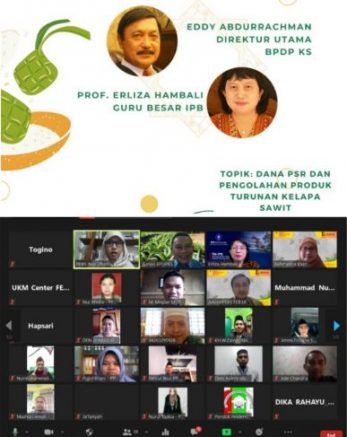PEBS FEB UI and BPDPKS Held a Santripreneur Monitoring Webinar
DEPOK – (7/11/2020) The Center for Sharia Economics and Business (PEBS) FEB UI in collaboration with the Oil Palm Plantation Fund Management Agency (BPDPKS), held a Webinar on the Opening of a Santripreneur Monitoring program, on Saturday (7/11/2020). This event was a part of activities in “The Development of Palm Oil MSME-based Santripreneur Potential as a Regional Economic Empowerment Program.” Those who participated in the event had previously gone through the assessment, launching, and bootcamp stages in three provinces, namely Riau, South Sumatra and North Sumatra.
This webinar opened a series of monitoring activities for participants from representatives of Islamic boarding schools in the three provinces, which will be held this November. The webinar presented two speakers, Prof. Erliza Hambali, Professor of Agricultural Industrial Engineering, Bogor Agricultural University and Dr. Sunari, Director of Fund Collection BPDPKS.
Opening the discussion, Rahmatina Awaliah Kasri, Ph.D., Head of PEBS FEB UI, said that the topic was raised based on input from the participants of pesantren representatives during the Santripreneur Bootcamp held last October. “I hope that the webinar and monitoring activities will later provide benefits for the participants to strengthen and realize their ideas into successful businesses,” said Rahmatina.
As the first speaker, Sunari explained the role of palm oil in general to the economy, the duties and functions of the BPDPKS, and the community oil palm rejuvenation program (PSR). Palm oil in Indonesia has an important role in creating jobs, reducing carbon through photosynthesis in huge plantations and can be used as biofuel. It also has an important role in economic growth. However, it is still necessary to develop markets and products for processed palm oil.
Sunari added, “The main objective of the PSR program is to help renew the palm oil plantations owned by the people, to make it more sustainable and of good quality and reduce the risk of illegal land clearing. In addition, various supports have been provided by BPDPKS, including biodiesel funding support, human resource development programs with scholarships, and support for palm oil research and development programs.
Erliza Hambali, the second speaker, explained about palm oil derivative products. She started by delivering an overview of palm fruit and the parts that can be used for its benefits, followed by a chart showing palm oil derivative products, such as cooking oil, margarine, palm kernel shell, etc. In addition to being able to be processed into various kinds of food products, palm oil can also be processed into oleochemical and bioenergy products.
Oil palm also produces diethanol amide (DEA) surfactant, an ingredient in pesticide products, home care, and personal care. In current condition, palm oil derivative products can be developed as antiseptic, hand sanitizer, and cleaner in powder form. In addition, other palm oil derivative products are bio-briquettes made from palm biomass. With the existence of various products derived from palm oil, Islamic boarding schools can focus on several products that are easy to develop, including soap and hand sanitizers. Once the product can be produced, the next step is to obtain a distribution permit.
The webinar went productively with participants asking questions, advice and direction in developing palm oil-based businesses, from funding, technical production, to mentoring. (Hjtp)
(am)




